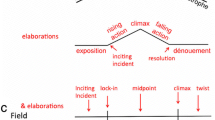Abstract
The authors of interactive fiction are beginning to demonstrate a concern for the literariness of their product. Literariness, as defined by Shklovskij and the Russian Formalists, is the quality of “making strange” that which is linguistically familiar, a quality Shklovskij termed ostranenie. By applying the principle of ostranenie, as well as other well-known literary principles, to the most serious interactive fictions, we can determine if this new genre exhibits the features of literariness. A study of Mindwheel, Brimstone, Breakers, A Mind Forever Voyaging, Portal, and Trinity suggest that the literariness of interactive fiction comes out of its concern both for “making strange” what is familiar and for “making familiar” what is strange.
Similar content being viewed by others
References
Adams, Douglas and Steve Meretzky. The Hitchhiker's Guide to the Galaxy. Adapted from the novel by Douglas Adams. Cambridge, Mass: Infocom, 1984.
Barol, Bill. “Zorked Again: Lost in Computer Fiction”. Newsweek, December 23, 1985, p. 70.
British, Lord. Ultima IV. Manchester, NH: Origin Systems, 1985.
Darrah, Bill. Essex. San Rafael, California: Synapse-Broderbund, 1985.
Eagleton, Terry. Literary Theory: An Introduction. Oxford: Basil Blackwell, 1983.
Erlich, Victor. Russian Formalism: History-Doctrine. 'S-Gravenhage: Mouton & Co., 1955.
Gygax, Gary. Dungeons and Dragons. Lake Geneva, Wisc.: TSR, 1978.
Hassan, Ihab. “Pluralism in Modern Perspective”. Critical Inquiry, 12, 3 (1986), 503–20.
Hawkes, Terence. Structuralism and Semiotics. Berkeley and Los Angeles: University of California Press, 1977.
Holland, Norman. “Literature as Transaction”. In What Is Literature? Ed. Paul Hernadi. Bloomington: Indiana University Press, 1978, pp. 206–18.
Iser, Wolfgang. “Indeterminacy and the Reader's Response”. In Aspects of Narrative. Ed. J. Hillis Miller. New York: Columbia University Press, 1971, pp. 1–46.
Jakobson, Roman. “Closing Statement: Linguistics and Poetics”. In Style and Language. Ed. Thomas Sebeok. Cambridge, Mass: MIT Press, 1960, pp. 350–77.
Jameson, Fredric. The Prison-House of Language. Princeton: University Press, 1972.
Johnson, Samuel. “Preface to Shakespeare”. In Criticism: The Major Statements. 2nd ed. Ed. Charles Kaplan. New York: St. Martin's, 1986.
Macdonell, Diane. Theories of Discourse. Oxford: Basil Blackwell, 1986.
Meretzky, Steve. A Mind Forever Voyaging. Cambridge, Mass: Infocom, 1985.
Mitchel, Philip, et al. The Hobbit. Reading, MA: Addison-Wesley, 1985.
Moriarty, Brian. Trinity. Cambridge, Mass: Infocom, 1986.
Niesz, Anthony J. and Norman N. Holland. “Interactive Fiction”. Critical Inquiry, 11, 1 (1984), 110–29.
Oxford Digital Enterprises. Macbeth. Baltimore: The Avalon Hill Game Company, 1986.
Paul, James. Brimstone. San Rafael, California: Synapse-Broderbund, 1985.
Pinsky, Robert. Mindwheel. San Rafael, California: Synapse-Broderbund, 1984.
Pinsky, Robert. “The Figured Wheel”. History of My Heart. New York: Ecco, 1984.
Randall, Neil. Storm of Dust. New York: Tor, 1987.
Randall, Neil. Seven No-Trump. New York: Tor, 1988.
Scholes, Robert. Semiotics and Interpretation. New Haven: Yale University Press, 1982.
Shklovskij, Viktor. Literatura i Kinematograf. Berlin, 1923. Quoted in Erlich, p. 227.
Smith, Rod. Breakers. San Rafael, California: Broderbund, 1986.
Swigrat, Rob. Portal. Mountain View, California: Activision, 1986.
Telarium Corp. Nine Princes in Amber. Cambridge, Mass: Telarium, 1985.
Ward, D. C. and Ian Weatherburn. The Neverending Story. Chatsworth, CA: Datasoft, 1986.
Wellek, Rene, and Austin Warren. Theory of Literature. 3rd ed. New York: Harcourt, Brace & World, 1956.
York, R. A. The Poem as Utterance. London: Methuen, 1986.
Author information
Authors and Affiliations
Additional information
Neil Randall has published several role-playing games, and is working on a full-length critical study of interactive fiction. He is currently assistant professor of English.
Rights and permissions
About this article
Cite this article
Randall, N. Determining literariness in interactive fiction. Comput Hum 22, 183–191 (1988). https://doi.org/10.1007/BF00118891
Issue Date:
DOI: https://doi.org/10.1007/BF00118891




